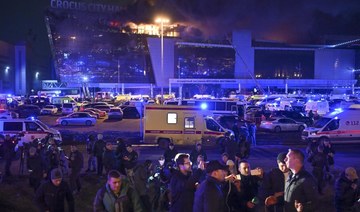SAO PAULO: Far-right congressman Jair Bolsonaro took an all but insurmountable lead in the race for Brazil’s presidency Sunday evening, as voters apparently looked past warnings that the brash former army captain would erode democracy and embraced a chance for radical change after years of turmoil.
With more than 94 percent of the votes counted, 55.5 percent supported Bolsonaro, compared to 44.4 percent for leftist Fernando Haddad of the Workers’ Party, according to the Supreme Electoral Tribunal. Final results were expected later Sunday, but Bolsonaro’s commanding lead was virtually unreachable.
In Rio de Janeiro, his supporters set off fireworks on iconic Copacabana Beach. In Sao Paulo, Brazil’s largest city, cars horns could be heard honking and crowds celebrated as the results came in.
Bolsonaro went into Sunday the clear front-runner after getting 46 percent of the vote to Haddad’s 29 percent in the first round of the election Oct. 7, which had 13 contenders. After opinion polls in recent weeks had Bolsonaro leading by as much as 18 percentage points, the race had tightened in recent days as several Brazilian heavyweights came out against Bolsonaro, arguing that he was a direct risk to the world’s fourth largest democracy.
Bolsonaro, who cast himself as a political outsider despite a 27-year career in Congress, is the latest of several leaders around the globe to gain prominence by mixing tough, often violent talk with hard-right positions. But he is also very much a product of a perfect storm in Brazil that made his messages less marginalized: widespread anger at the political class amid years of corruption, an economy that has struggled to recover after a punishing recession and a surge in violence.
“I feel in my heart that things will change,” said Sandra Coccato, a 68-year-old small business owner, after she voted for Bolsonaro in Sao Paulo. “Lots of bad people are leaving, and lots of new, good people are entering. There’s a light at the end of the tunnel.”
Bolsonaro rose in prominence amid disgust with Brazil’s political system. In particular, many Brazilians are furious with the Workers’ Party for its role in the graft scheme, known as “Carwash” and Haddad has struggled to build momentum with his promises of a return to the boom times by investing in health and education and reducing poverty.
Along the way, he has also raised serious concerns that he will usher in a rollback of civil rights and a weakening of institutions in what remains a young democracy, especially since he has waxed nostalgic for Brazil’s 1964-1985 military dictatorship and said he would name military men to his Cabinet.
In a highly unusual moment, the chief justice of the Supreme Court, Jose Dias Toffoli, read out part of the Constitution to reporters after he voted.
“The future president must respect institutions, must respect democracy, the rule of law, the judiciary branch, the national Congress and the legislative branch,” Toffoli said in remarks many took to be a rebuke of Bolsonaro and his more extreme positions.
As late as Sunday morning, Haddad was still holding out hope that he could win after several key endorsements late Saturday.
Among them were a popular former Supreme Court justice, Joaquim Barbosa, who tweeted support for Haddad, saying Bolsonaro’s candidacy scared him. Likewise, former Attorney General Rodrigo Janot, one of the biggest crusaders against corruption in Haddad’s Workers’ Party in recent years, endorsed Haddad for similar reasons.
One of the most important endorsements, particularly for young people, came from Youtuber Felipe Neto, whose channel has nearly 27 million followers.
Neto said he was troubled by Bolsonaro’s comments a week ago that “red” leftists would be run out of Brazil.
“In 16 years of the (Workers’ Party), I have been robbed, but never threatened,” Neto said by Twitter.
The past few years in Brazil have been exceptionally turbulent. In 2016, then-President Dilma Rousseff of the Workers’ Party was impeached and removed from office on charges that many on the left felt were politically motivated. The economy suffered a two-year-long recession and is only beginning to emerge, with growth stagnant and unemployment high. And scores of politicians and executives have been jailed in the Carwash corruption investigation that uncovered a multi-billion-dollar scheme to trade public contracts and official favors for bribes and kickbacks.
That instability unleashed extreme anger with the political class but also revealed deep divisions in Brazilian society, and this campaign was the most polarized in decades. There were numerous reports of politically motivated violence, especially directed at gay people, whom Bolsonaro has disparaged. Bolsonaro himself was stabbed and almost died at a campaign event in early September.
“I’m not crazy about Bolsonaro. But he is our way to keep the Workers’ Party out of office,” said Rafaela Rosa, a 32-year-old teacher, after voting Sunday in Sao Paulo. “We have had enough corruption and now we need to clean up.”
Many observers predicted that a newcomer would emerge to harness that anti-establishment anger. Instead, support coalesced around Bolsonaro, who both is and isn’t an outsider: He has served for nearly three decades in Congress, but he has often been at the margins of that institution and he painted himself as just the strong man Brazil needed to dismantle a failing system. Bolstering his rebel image is his reputation for offensive statements and sometimes extreme views, including insulting women, gays and blacks.
Bolsonaro’s campaign first gained traction with his promises to go after violent crime in a country that leads the world in homicides and where many Brazilians live in daily fear of muggings or burglaries. But his vows to loosen gun laws and give police a freer hand to use force against suspects have also raised concerns that a Bolsonaro presidency could lead to a bloody crackdown and an erosion of civil rights.
The campaign gained momentum by winning over much of the business community with promises of enacting market-friendly reforms that would reduce the size of the Brazilian state, including cutting ministries and privatizing state companies.
Far-right Jair Bolsonaro poised to win Brazil’s presidency
Far-right Jair Bolsonaro poised to win Brazil’s presidency
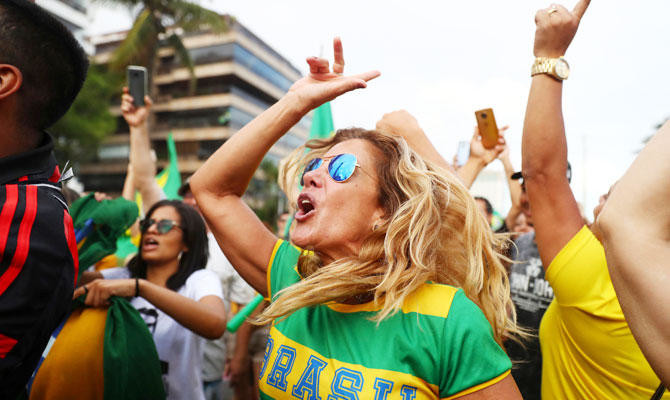
- Brazil's Supreme Electoral Tribunal says that with more than 88 percent of the votes counted, 55.7 percent supported Bolsonaro, while 44.3 percent backed leftist Fernando Haddad of the Workers' Party
Anti-war protesters dig in as some schools close encampments after reports of antisemitic activity
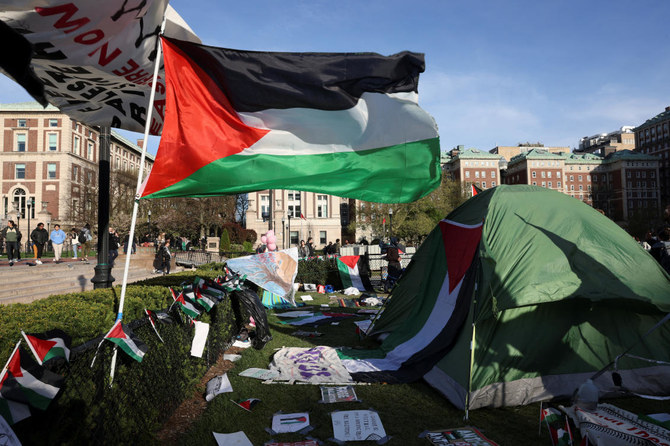
Early Saturday, police in riot gear cleared an encampment on the campus of Northeastern University in Boston while several dozen students shouted and booed at them
NEW YORK: As students protesting the Israel-Hamas war at universities across US dug in Saturday and vowed to keep their demonstrations going, some universities shut down encampments after reports of antisemitic activity among the protesters.
With the death toll mounting in the war in Gaza, protesters nationwide are demanding that schools cut financial ties to Israel and divest from companies they say are enabling the conflict. Some Jewish students say the protests have veered into antisemitism and made them afraid to set foot on campus.
Early Saturday, police in riot gear cleared an encampment on the campus of Northeastern University in Boston while several dozen students shouted and booed at them from a distance, but the scene was otherwise not confrontational.
The school said in a statement that the demonstration, which began two days ago, had become “infiltrated by professional organizers” with no affiliation to the school and protesters had used antisemitic slurs.
“We cannot tolerate this kind of hate on our campus,” the statement posted on the social media platform X said.
The University of Pennsylvania took similar action Friday when interim President J. Larry Jameson called for an encampment of protesters on the west Philadelphia campus to be disbanded, saying it violates the university’s facilities policies.
The “harassing and intimidating comments and actions” by some protesters violate the school’s open expression guidelines as well as state and federal law, Jameson said, and vandalism of a statue with antisemitic graffiti was “especially reprehensible and will be investigated as a hate crime.”
“I am deeply saddened and troubled that our many efforts to respectfully engage in discourse, support open expression, and create a community that is free of hate and inclusive for everyone have been ignored by those who choose to disrupt and intimidate,” he said.
At Columbia University, where protesters have inspired pro-Palestinian demonstrations across the country, negotiations continued with those at the student encampment.
The university’s senate passed a resolution Friday that created a task force to examine the administration’s leadership, which last week called in police in an attempt to clear the protest, resulting in scuffles and more than 100 arrests.
Though the university has repeatedly set and then pushed back deadlines for the removal of the encampment, the school sent an email to students Friday night saying that bringing back police “at this time” would be counterproductive.
Decisions to call in law enforcement, leading to hundreds of arrests nationwide, have prompted school faculty members at universities in California, Georgia and Texas to initiate or pass votes of no confidence in their leadership. They are largely symbolic rebukes, without the power to remove their presidents.
But the tensions pile pressure on school officials, who are already scrambling to resolve the protests as May graduation ceremonies near.
California State Polytechnic University, Humboldt, gave protesters who have barricaded themselves inside a building since Monday until 5 p.m. Friday to leave and “not be immediately arrested.” The deadline came and went. Only some of the protesters left, others doubled down. After protesters rebuffed police earlier in the week, the campus was closed for the rest of the semester.
In Colorado, police swept through an encampment Friday at Denver’s Auraria Campus, which hosts three universities and colleges, arresting about 40 protesters on trespassing charges.
Students representing the Columbia encampment said Friday that they reached an impasse with administrators and intend to continue their protest. After meetings Thursday and Friday, student negotiators said the university had not met their primary demand for divestment.
In the letter sent to Columbia students Friday night, the university’s leadership said “we support the conversations that are ongoing with student leaders of the encampment.”
Columbia’s president, Minouche Shafik, faced significant criticism from faculty Friday, but retained the support of trustees.
A report by the university senate’s executive committee, which represents faculty, found Shafik and her administration took “many actions and decisions that have harmed Columbia University.” Those included calling in police and allowing students to be arrested without consulting faculty, misrepresenting and suspending student protest groups and hiring private investigators.
Also Friday, Columbia student protester Khymani James walked back comments made in an online video in January that recently received new attention. James said in the video that “Zionists don’t deserve to live” and people should be grateful James wasn’t killing them.
“What I said was wrong,” James said in a statement. “Every member of our community deserves to feel safe without qualification.”
James, who served as a spokesperson for the pro-Palestinian encampment as a member of Columbia University Apartheid Divest, was banned from campus Friday, according to a Columbia spokesperson.
Protest organizers said James’ comments didn’t reflect their values. They declined to describe James’ level of involvement with the demonstration.
In France, students at the Paris Institute of Political Studies, which counts President Emmanuel Macron among its many famous alumni, students blocked access to a campus building and classes went online as the wave of protests reached overseas.
Police clashed with protesters Thursday at Indiana University, Bloomington, where 34 were arrested; Ohio State University, where about 36 were arrested; and at the University of Connecticut, where one person was arrested.
The University of Southern California canceled its May 10 graduation ceremony Thursday, a day after more than 90 protesters were arrested on campus. The university said it will still host dozens of commencement events, including all the traditional individual school ceremonies.
Universities where faculty members have initiated or passed votes of no confidence in their presidents include Cal Poly Humboldt, University of Texas at Austin and Emory University.
Russia says it struck Ukrainian energy plants in response to Kyiv targeting its own energy sector
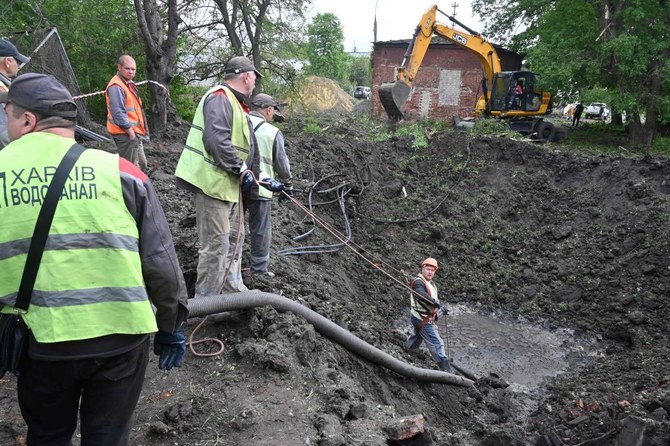
- The strikes were “in response to attempts by the Kyiv regime to damage Russian energy and industrial facilities“
- Ukraine has systematically targeted Russian oil refineries and other facilities in drone attacks in recent weeks
MOSCOW: The Russian Defense Ministry said on Saturday that its forces had carried out 35 strikes in the last week against Ukrainian energy facilities, defense factories, railway infrastructure, air defenses, and ammunition stocks.
It said in a statement that the strikes, which spanned April 20-27, were “in response to attempts by the Kyiv regime to damage Russian energy and industrial facilities.”
Ukraine has systematically targeted Russian oil refineries and other facilities in drone attacks in recent weeks, ignoring US requests not to do so.
Ukrainian officials said Russian missiles had pounded power facilities in central and western Ukraine on Saturday, increasing pressure on the ailing energy system as the country faces a shortage of air defenses despite a breakthrough in US military aid.
The Russian Defense Ministry said its campaign of strikes had been conducted using sea- and air-launched long-range precision weapons, including Kinzhal hypersonic missiles and drones.
It said it had also targeted and hit Ukrainian troop formations as well as what it described as foreign mercenaries.
Philippine capital’s financial center to become halal hub
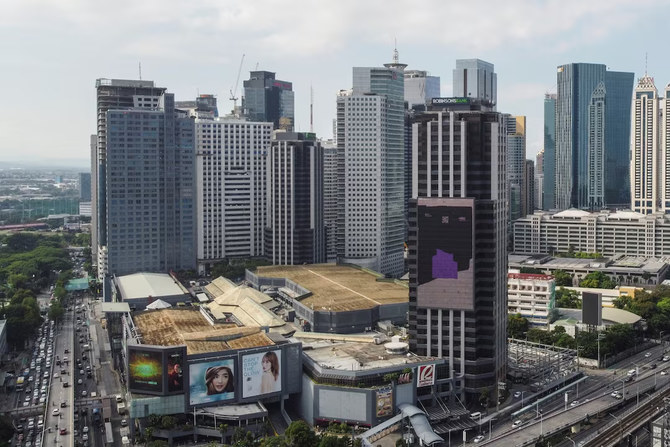
- Makati Halal Hub to act as a platform for manufacturers, traders and consumers
- Philippines’ central business district is perceived as trendsetter for other regions
MANILA: Philippine businesses in Makati City are joining hands with the Department of Trade and Industry to make the country’s financial center a halal hub, the head of the Philippine Chamber of Commerce and Industry’s Makati branch said on Saturday.
Makati City in Metro Manila is often referred to as the Philippines’ central business district. It has the highest concentration of banks and multinational and local corporations in the country. Foreign embassies are also based there.
The predominantly Catholic Philippines — where Muslims constitute about 10 percent of the nearly 120 million population — plans to raise 230 billion pesos ($4 billion) in investments and generate around 120,000 jobs by expanding its domestic halal industry by 2028.
The DTI signed on Friday a memorandum of understanding with PCCI Makati to join the government’s efforts to tap into the global halal market, which is estimated to be worth more than $7 trillion.
“To be able to implement its policies more effectively — such as the promotion and development of the country’s halal industry — they (the government) have to collaborate or strike a partnership with the business community or the businessmen who will be responsible in making this a reality,” PCCI Makati President Toots Cortez told Arab News.
“We can be the catalyst. We will begin by creating awareness, especially among the MSMEs (micro, small and midsize enterprises) because, according to the records of DTI, 99.5 percent of business in the Philippines are composed of SMEs.”
The agreement on establishing the Makati Halal Hub will position the city as a “central point for innovation and business in the halal sector, spanning a variety of industries including food production, financial services, and more,” the DTI said in a statement, as it expects the initiative to “provide substantial opportunities for Filipino entrepreneurs and international investors alike, fostering a robust economic ecosystem.”
According to the vision, the hub will act as a platform facilitating connections between manufacturers, traders, buyers, distributors and consumers in the halal sector.
“If we can group together and promote halal, I think that will be the best approach … You don’t need a big budget,” Cortez said.
“There are many Muslim embassies in Makati City, many restaurants and major establishments … Many tourists come to Makati, so if we can convince the establishments in Makati to be accredited as halal, that’s a good beginning from our side as a catalyst.”
He believes that the industry’s promotion in the city will make an impact as Makati is widely perceived as a trendsetter for other Philippine regions.
“The others, they follow the lead,” Cortez said. “They follow the lead on what’s happening in Makati City.”
US food regulator gathering information on Indian spices after alleged contamination

- MDH and Everest spices are among the most popular in India and are also sold in Europe, Asia and North America
- Hong Kong this month suspended sales of four MDH and Everest blends, while Singapore recalled Everest spice mix
HYDERABAD: The US Food and Drug Administration (FDA) is gathering information on products of Indian spice makers MDH and Everest after Hong Kong halted sales of some of their products for allegedly containing high levels of a cancer-causing pesticide.
“The FDA is aware of the reports and is gathering additional information about the situation,” an FDA spokesperson told Reuters on Friday.
Hong Kong this month suspended sales of three MDH spice blends and an Everest spice mix for fish curries. Singapore ordered a recall of the Everest spice mix as well, saying it contains high levels of ethylene oxide, which is unfit for human consumption and a cancer risk with long exposure.
Reuters is the first to report the US FDA’s review of alleged contamination of Indian spice products.
MDH and Everest did not immediately respond to Reuters requests for comment on this matter.
Everest has previously said its spices are safe for consumption. MDH has not responded to queries about its products so far.
MDH and Everest spices are among the most popular in India and are also sold in Europe, Asia and North America. India’s food regulator, the Food Safety and Standards Authority of India (FSSAI), is now checking the quality standards of the two companies, following the moves in Hong Kong and Singapore.
India’s Spices Board, the government’s regulator for spice exports, said on Wednesday it had sought data on MDH and Everest exports from authorities in Hong Kong and Singapore, and was working with the companies to find the “root cause” of the quality issues as inspections started at their plants.
In 2019, a few batches of MDH’s products were recalled in the US for salmonella contamination.
Taiwan reports Chinese military activity after Blinken leaves Beijing
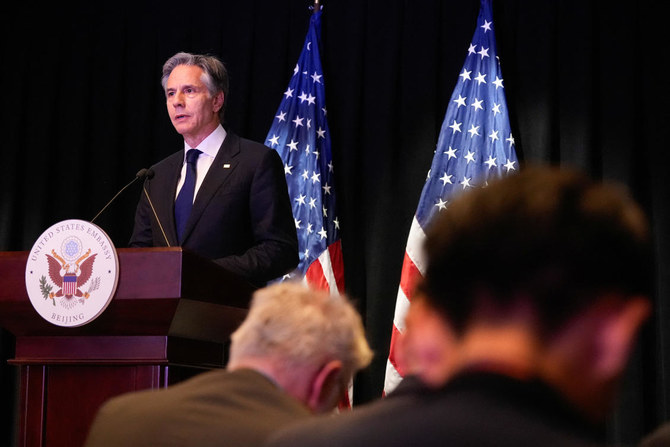
- US Secretary State Antony Blinken has stressed the ‘critical importance’ of maintaining peace and stability across Taiwan Strait while in China
TAIPEI: Taiwan reported renewed Chinese military activity near the island on Saturday with 12 aircraft crossing the sensitive median line of the Taiwan Strait, a day after US Secretary State Antony Blinken ended a visit to China.
The United States is Taiwan’s most important international supporter and arms supplier despite the absence of formal diplomatic ties. Blinken said he had stressed the “critical importance” of maintaining peace and stability across the strait while in China.
Democratically governed Taiwan has faced increased military pressure from China, which views the island as its own territory. Taiwan’s government rejects those claims.
Taiwan’s defense ministry said that from 9:30 a.m. (0130 GMT) on Saturday it had detected 22 Chinese military aircraft, including Su-30 fighters, of which 12 had crossed the median line to Taiwan’s north and center.
The line once served as an unofficial border between the two sides over which neither sides’ military crossed, but China’s air force now regularly sends aircraft over it. China says it does not recognize the line’s existence.
Taiwan’s defense ministry said the aircraft were involved in “joint combat readiness patrols” with Chinese warships, adding that Taiwanese aircraft and ships responded “appropriately.” It did not give details.
China’s defense ministry did not answer calls seeking comment outside of office hours on Saturday.
Taiwan’s armed forces are well-equipped and well-trained but dwarfed by those of China’s, especially the navy and air force, which respond almost daily to Chinese missions.
China considers Taiwan the most important issue in its relations with the United States, and Beijing has repeatedly demanded Washington end weapons sales to Taiwan.
Taiwan President-elect Lai Ching-te takes office on May 20 after winning January’s election. Beijing considers him a dangerous separatist and has rebuffed his repeated calls for talks.
Lai said on Thursday that China should have the confidence to talk to Taiwan’s legally elected government. Like outgoing President Tsai Ing-wen, Lai says only Taiwan’s people can decide their future.





